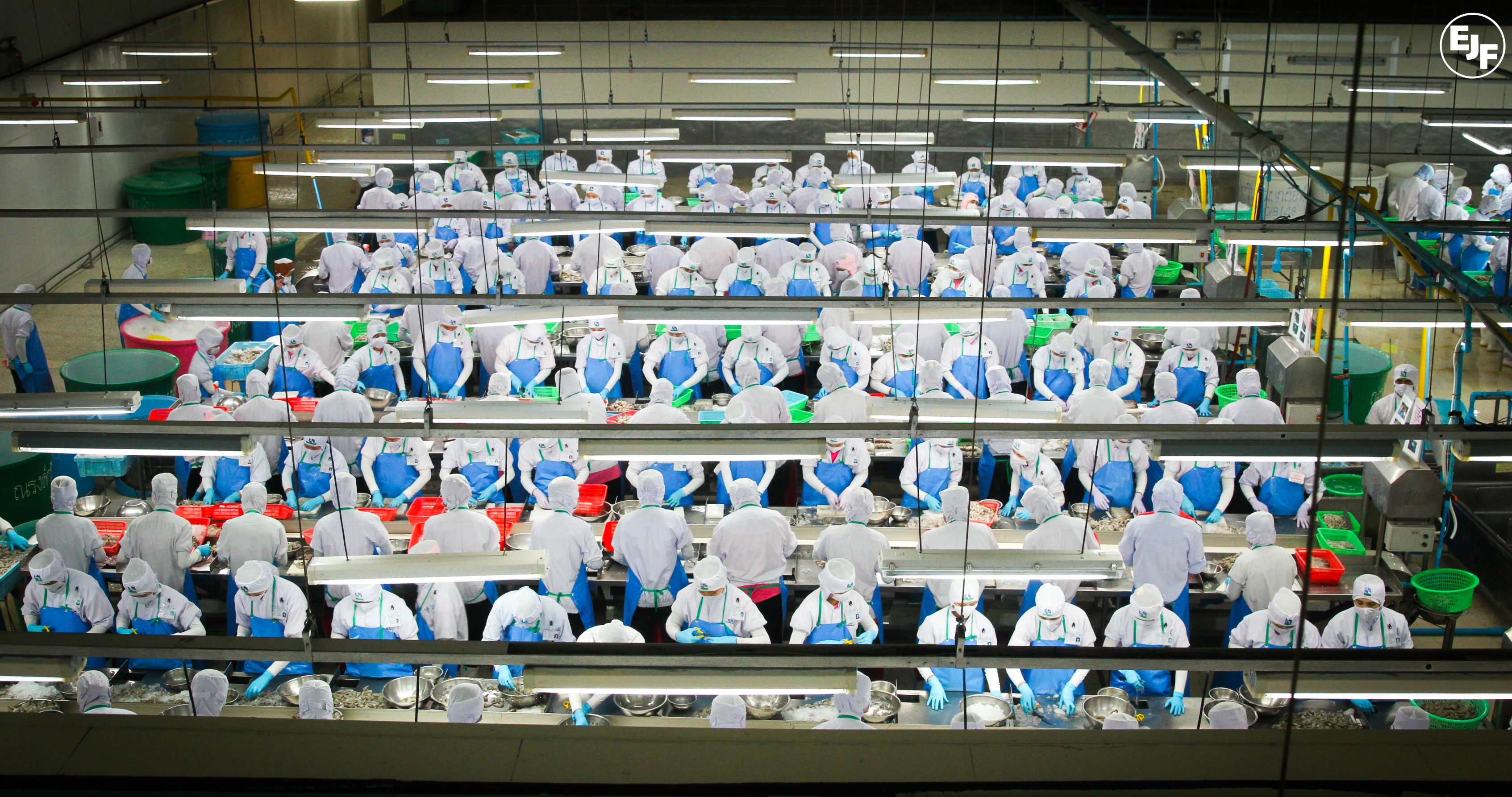
EJF releases report into human rights abuses in Thailand’s shrimp industry
The Hidden Cost: Human Rights Abuses in Thailand’s Shrimp Industry, a new report published today, exposes the reliance of Thailand’s shrimp industry on migrant workers, many of whom are trafficked and face arduous journeys, and even armed robbery, before enduring abusive conditions in shrimp processing factories, including confiscation of identification documents, withholding of pay, forced detention and bonded labour.
During investigations carried out in October 2012 and March 2013, EJF gathered evidence of perilous human trafficking into Thailand, as well as serious labour and human rights violations in shrimp facilities.
“I think [people in the West] eat shrimp because they don’t know how it is produced at the factory. If they knew, they wouldn’t eat it.” Aung Aye, an 11-year-old former shrimp peeler
EJF interviewed five former workers at a pre-processing factory owned by a Captain in the Royal Thai Police. They had all been trafficked into debt bondage and had their identification documents confiscated, their movements restricted and were forced to work up to 16-hour shifts. One of the interviewees was just 10 years old at the time and recalled 8 or 9 children working in the factory, peeling shrimp and extracting excrement until 8pm every day.
EJF recorded the first-hand accounts of a further 12 current and former migrant peeling shed workers, all from Myanmar. Eleven of the workers had entered Thailand illegally with the help of a broker and had their passports removed by their employers. One family of three reported being physically abused and having their pay withheld.
The Hidden Cost follows EJF’s Sold to the Sea report and film, published in May this year, which revealed evidence of human trafficking, labour abuse and the routine use of violence, including murder, in the Thai fishing industry.
Watch the film: The Hidden Cost
First-hand testimonies recorded by EJF investigators:
“We had to walk 9 nights and 8 days [through the forest]... I faced hunger and many troubles and saw the sexual abuse of girls with my own eyes. When we walked by ‘Robbers’ Mountain’ we kept our heads down, but robbers with masks came down to us. They held guns in their hands and surrounded us... They took our property and asked the navigators to offer girls to them...They raped girls in the bush one after another.”
“I am eleven years old. I had to peel the shrimp shells and extract excrement... There were about 8 or 9 children in the factory... We finished work around 8pm.”
“The employer keeps our passports. We never get to hold any documents... We have lived here for 2 years and my debt is 12,000 baht [EJF note: approx. £238 GBP]. There are some workers who ran away. There are some who are caught and they are not brought back to the factory... others are being sold.”
Steve Trent, Executive Director of EJF, said:
“EJF previously uncovered the use of trafficked, threatened and abused workers on Thai fishing vessels to supply fish to the shrimp industry. Our new report The Hidden Cost reveals that the shrimp supply chain itself also is also hiding severe systemic labour abuses.
The Thai authorities are aware of human trafficking into the shrimp industry and that enforcement agencies are failing to protect vulnerable workers. Worse, we believe that our research and that of others now clearly shows that the exploitation of labour in this way is a central part of an economic model that is driving cheap cash exports to Western markets. We can clearly say that shrimp prepared by workers who have been trafficked, held in bonded labour and subject to abusive working conditions, is right now entering our markets and arriving on our plates.
EJF is advocating for the Thai Government, the international community and retailers to work together to stop these abuses. But, we are also clear that without immediate proof of real action and real results the lucrative European and Western markets should be closed to Thai shrimp. There are no excuses for the failure of Thai authorities and companies to act and they must be called to account. In the 21st century food produced by slavery, forced, bonded and trafficked labour should not be on our plates.”